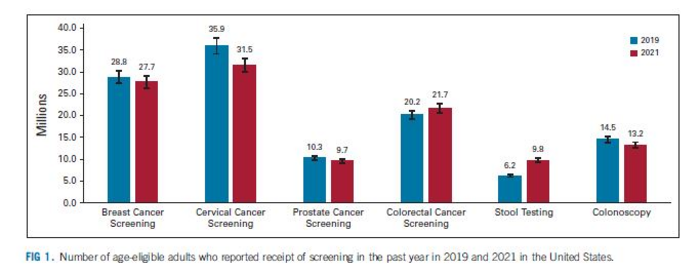ATLANTA, February 23, 2023 — According to a new, nationwide study led by researchers at the American Cancer Society (ACS), millions of people in the United States continued to miss critical cancer screening tests during the second year of the COVID-19 pandemic. The number of women who reported having cervical cancer screening dropped by 4.4 million in 2021 versus 2019 levels. The study also showed 1.1 million fewer women received breast cancer screening and close to 700,000 thousand fewer men reported having a prostate cancer screening test. The research was published today in the Journal of Clinical Oncology (JCO).

Credit: American Cancer Society
ATLANTA, February 23, 2023 — According to a new, nationwide study led by researchers at the American Cancer Society (ACS), millions of people in the United States continued to miss critical cancer screening tests during the second year of the COVID-19 pandemic. The number of women who reported having cervical cancer screening dropped by 4.4 million in 2021 versus 2019 levels. The study also showed 1.1 million fewer women received breast cancer screening and close to 700,000 thousand fewer men reported having a prostate cancer screening test. The research was published today in the Journal of Clinical Oncology (JCO).
“The COVID-19 pandemic continues to have a detrimental effect on important cancer screenings in this country,” said Jessica Star, associate scientist, cancer risk factors and screening surveillance research at the American Cancer Society and lead author of the study. “It’s critical to get people back into their doctor’s offices to help prevent and catch cancer at its earliest stages when it might be easiest to treat.”
For the study, researchers analyzed data from the 2019 and 2021 National Health Interview Survey. They examined information on receipt of screening for breast cancer (women 50-74 years old), cervical cancer (women without a hysterectomy, 21-65 years old), prostate cancer (men 55-69 years old), and colorectal cancer (men and women 50-75 years old).
The findings showed, between 2019 and 2021, past-year screening in the United States decreased from 59.9% to 57.1% for breast cancer, from 45.3% to 39.0% for cervical cancer, and from 39.5% to 36.3% for prostate cancer. Declines in breast, cervical, and prostate cancer screening were most notable for non-Hispanic Asian persons. Colorectal cancer screening rates remained unchanged because an increase in past-year stool testing (from 7.0% to 10.3%) offset a decline in colonoscopy (from 15.5% to 13.8%). The increase in stool testing was most pronounced in non-Hispanic Black and Hispanic populations and in persons with low socioeconomic status, potentially reducing racial and socioeconomic disparity in colorectal cancer screening. The authors, however, stated that the increase in stool testing requires increased colonoscopy follow-up of positive tests; and the importance of home-based testing to maintain screening levels during healthcare disruptions.
“We can’t stress enough the importance of returning to screening,” said Dr. Ahmedin Jemal, senior vice president, surveillance & health equity science at the American Cancer Society and senior author of the study. “We need to continue health system and national cancer screening campaigns and focus our efforts toward people of color and lower socioeconomic standing to improve access to life-saving screenings.”
The ACS continues to promote its Get Screened campaign to encourage people to schedule regular cancer screening tests.
Other ACS study authors include: Dr. Priti Bandi, Rebecca L. Siegel, Dr. Xuesong Han, Adair Minihan, and Dr. Robert A. Smith.
# # #
About the American Cancer Society
The American Cancer Society is a leading cancer-fighting organization with a vision to end cancer as we know it, for everyone. For more than 100 years, we have been improving the lives of people with cancer and their families as the only organization combating cancer through advocacy, research, and patient support. We are committed to ensuring everyone has an opportunity to prevent, detect, treat, and survive cancer. To learn more, visit cancer.org or call our 24/7 helpline at 1-800-227-2345. Connect with us on Facebook, Twitter, and Instagram.
Journal
Journal of Clinical Oncology
Article Publication Date
23-Feb-2023



